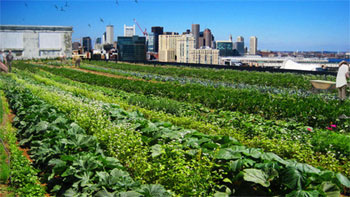To help the world’s emerging cities develop in sustainable ways, the "Global Platform for Sustainable Cities" launched this week.
Starting with 23 key cities, $150 million in seed money is expected to mobilize about $1.5 billion in the next five years in Brazil, Cote D’Ivoire, China, India, Malaysia, Mexico, Paraguay, Peru, Senegal, South Africa, and Vietnam.
Backed by the World Bank and Global Environment Facility, multilateral banks and think tanks, the goal is to help cities use green planning processes as they grow and to integrate adaptations they will need to cope with climate change.
"If planned and managed well, compact, resilient, inclusive, and resource-efficient cities can drive development, growth, and creation of jobs, while also contributing to a healthier, better quality of life for residents and the long-term protection of the global environment," explains Naoko Ishii, Global Environment Facility CEO. "In a rapidly urbanizing world, how we design and build the cities of the future will play a critical role in protecting the global commons, the planet’s finite environmental resources that have provided for the stable conditions enjoyed by humanity for thousands of years."
Mayors and other municipal leaders will learn from peers and experts on establishing sustainability indicators for their city, using geospatial data for urban planning, and how to tackle day-to-day management on issues like access to clean water, energy, and transport that in ways that mitigate climate change instead of stoking it further.
Vegetables grow on a green roof in Boston:

Prioritizing non-motorized, low-emission transport, rooftop solar, super-efficient buildings, high recycling levels and landfill gas capture, and green infrastructure lays the groundwork for healthier cities, with much lower energy costs, saving about $17 trillion by 2050, according to New Climate Economy. It would also reduce emissions equivalent to India’s today.
"Infrastructure investments made in cities over the next few decades will lock the world into either a higher- or lower carbon path … Adopting more compact, connected and efficient forms of urban development would stimulate economic activity, attract investment, improve air quality and public health, enhance safety, help to reduce poverty and avoid the substantial costs associated with sprawl – all while making a significant contribution to global climate change mitigation," they say.
All cities need to quickly move in this direction. Currently, cities consume over two-thirds of the world’s energy supply and are responsible for 75% of energy-related greenhouse gas emissions. More than 2 billion people will live in cities by 2050, a 50% increase from today, with most of the growth in Asia and Africa.
Mayors from 640 cities in 115 countries gathered at the Paris Climate Summit and are pushing these ideas along through the Carbon Neutral Cities Alliance, C40 Cities, and the City Energy Project in the US.
President Obama launched a major Smart Cities Initiative in the US, and our climate agreement with China includes the Climate-Smart/Low-Carbon Cities Initiative. Japan and India are also moving forward on Smart Cities. In Austria, Siemens and partners test designs and systems for intelligent cities of the future. There’s even certification for smart cities.
Here’s New Climate Economy’s report, Accelerating Low-Carbon Development in the World’s Cities:

